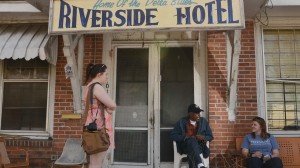
Rachael Walker and Katie Williamson interview Frank ‘Rat’ Ratliff in front of Riverside Hotel in Clarksdale on March 15, 2013. Ratliff died 13 days after UM students interviewed him about the hotel. Photo by Phillip Waller
OXFORD, Miss. – Students at the University of Mississippi’s Meek School of Journalism and New Media have been gaining valuable work experience through partnerships with print and broadcast media outlets across the state.
Each year, about 60 students participate in newspaper reporting trips on which they spend a weekend writing stories or shooting photos for different papers. Broadcast students also have been working on pieces for Tupelo’s WTVA-TV and a local news website as part of the program.
In September, several students went to the Leland Progress newspaper and wrote pieces that will be used to create a magazine for visitors and newcomers. The students brought a fresh perspective, as many of them had never been to the small Delta town, said Stephanie Patton, editor and publisher of the Progress. That perspective is particularly useful for the magazine, which is also geared toward people who may not have been there before.
“It’s a great program, not just for the communities and the benefits Leland gets out of it, but it’s great for the students to get out and see different parts of Mississippi they haven’t been exposed to and also have this interaction with real business and city leaders,” Patton said. “That’s great real-world experience that you can’t always get inside a classroom.”
While in Leland, the students did a piece on Muppets’ creator Jim Henson’s ties to the area, the blues music scene and other stories.
They’ve also worked for other newspapers, including taking on a story to preview congressional elections for the Northeast Mississippi Daily Journal in Tupelo. They did stories on downtown redevelopment for the Hattiesburg American. They’ve also worked for newspapers in Madison, Hernando, Vicksburg and other Mississippi cities. The newspaper program is in its fourth year.
UM adjunct journalism instructor Bill Rose has been leading the newspaper trips, which are open to any journalism major. Many freshmen and sophomore students gain valuable experience through the trips that they wouldn’t have otherwise, Rose said.
“Students love it because it gives them confidence and a sense of how it is in the real world, and also how much they have to learn,” he said.
During the last two years, 12 broadcast journalism majors have worked with WTVA on coverage of the Double Decker Arts Festival in Oxford. They’ve also worked on other pieces for the station.
Debora Wenger and Nancy Dupont, two associate broadcast journalism professors, have been working with the students. The program allows students to learn from seasoned professionals, Wenger said.
“The students know their work is going to air on a newscast that night, and they get this one-on-one instruction from the news managers at the station,” Wenger said. “It helps reinforce a lot of the concepts we try to teach them in class, but often, they don’t believe it until they hear it from somebody who is still in the newsroom.”
The intense deadline pressures of daily journalism also become more real to students.
“It teaches them to write quickly and edit quickly,” Wenger said. “It puts real-time pressure on them in a way that is hard to simulate in the classroom.”
Journalism Dean Will Norton said he hopes the program will expand in the coming years.
“We eventually want to get to a place to where we are doing a lot more of these, but we have to wait until our endowment grows,” Norton said. “I think this is one of the important issues – to enable students to understand the mass media doesn’t just exist to cover what is happening. The mass media exists to hold a community together, to enable you to have good government, good hospitals and water that runs. That’s what the mass media is supposed to do.”